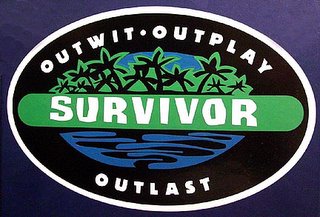
I’m thinking today about what it means to be a cancer survivor.
Not a survivor as in that late, lamentable television series – the one with the gang of quirky individuals who, one by one, vote each other off a desert island – but a more positive ideal. Several weeks ago, I was filling out a form to register for an educational teleconference sponsored by the Leukemia and Lymphoma Society, when I noticed the form did not provide a check-off box for cancer patients. There was a box for health-care providers, and another for family members – but nothing for patients. The only remaining choice was to call myself a cancer survivor.
Wait a minute, I thought to myself. There’s been some mistake. But then I caught on. Everyone who is living with cancer is a cancer survivor! I checked the box, but still felt a bit uncomfortable doing so. My cancer diagnosis was only days old. I hadn’t yet received any treatment. How could I claim to belong to that courageous company of survivors – they who have weathered chemotherapy, or radiation, or surgery, or all three – that legion of battle-hardened veterans who have been knocked down time and time again, but have always gotten right back up? Had I truly earned my survivor’s merit badge?
In his classic book, Love, Medicine and Miracles: Lessons Learned About Self-Healing from a Surgeon’s Experience with Exceptional Patients (Harper Perennial, 1986), Bernie Siegel tells of a study of Korean War military survivors that was conducted by a psychologist, Al Siebert:
“He has found that one of their most prominent characteristics is a complexity of character, a union of many opposites that he has termed biphasic traits. They are both serious and playful, tough and gentle, logical and intuitive, hard-working and lazy, shy and aggressive, introspective and outgoing, and so forth. They are paradoxical people who don’t fit into the usual psychological categories. This makes them more flexible than most people, with a variety of resources to draw on” (p. 161).
Siegel continues,
“As patients, those who have or are developing survival traits are self-reliant and seek solutions rather than lapsing into depression. They interpret problems as redirections, not failures. They are the ones who read or meditate in the waiting room instead of staring forlornly into space” (pp. 162-163).
As a minister, I’ve always known this to be true – on an intellectual level. As I’ve visited patients in hospitals and prayed with them, I’ve seen some who have taken hold of their treatment and proceeded with a positive, can-do attitude, and others who just give up the ghost. I don’t need to tell you which sort of patient typically does better.
It’s the survivors who survive. That sounds like a truism, I know, but that's the way it is. The task before me in the months to come is not only to seek to fall in with that company, but also to feel like I belong in their midst.
8 comments:
I must look up this book by Al Siebert. Survivors are an unusual breed.
Although I don't know you, I will add you to my prayers. Keep up with the posting.
I don't know about the Siebert book, or whether it's even in print. It was quoted in the Love. Medicine and Miracles book by Bernie Siegel (similar name), which is a wonderful book, and still available. I've recommended it to a number of people who are dealing with chronic medical conditions, not just cancer.
Here's a link to the Bernie Siegel book on Amazon.com:
http://www.amazon.com/gp/product/0060919833/qid=1137156054/sr=1-1/ref=sr_1_1/002-0080300-8244015?s=books&v=glance&n=283155
Carl, we have been involved for the past three years in the ACS Relay For Life -(a fund raising event where teams of people walk the track around the football field constantly for 24 hours - it's done throgh the high school)- and one of the things that happens every year is the survivors are honored with a victory lap - and that is the langague - a survivor's victory lap. Doesn't matter if you've been battling for years or were discovered yesterday. Once it is real in your life, you become a survivor! Yes, the tears flow, and the applause is wonderful. And those who arn't strong enough are carried, or pushed, or whatever is needed. You are a survivor already - especially with your courage and resolve to let us in on this journey with you. Thanks. Bob.
Thank you. I looked it up. Al Siebert has his own website. Here's a link:
http://www.resiliencycenter.com
Best wishes to you. Keep up with the posting. I hope you don't mind...I added a link on my blog to yours.
Thanks for this, WW. The Resiliency Center site is interesting.
And yes, I'm glad to have you link your blog to mine.
The Resiliency Center! What a wonderful site! And his thesis is so true . . . I will begin passing it along. Yes, we observe it in others, but what an attribute to cultivate in ourselves! Robin
I am a survivor. But.. perhaps more than that.
My first 30 years were taken from me, and the remainder wobbled on the lame duck of my past. But I am wonderfully grateful to have had the remainder. Living death was a horror, to never have awaken from that would be a worse horror.
The one who cured me, who founded the groups that cured me, he was a Polish surivor of several concentration camps. Being a doctor he was transferred twice I think. The third time, lucky ,because if I remember correctly they were liberated on the train to the final camp.
At first, he said for days he only thought of food, nothing else, not even sex. This deprivation and then liberation (from any kind of bondage) and resulting fierce desire for life or something in life, I think it makes the person very strong.
Post a Comment